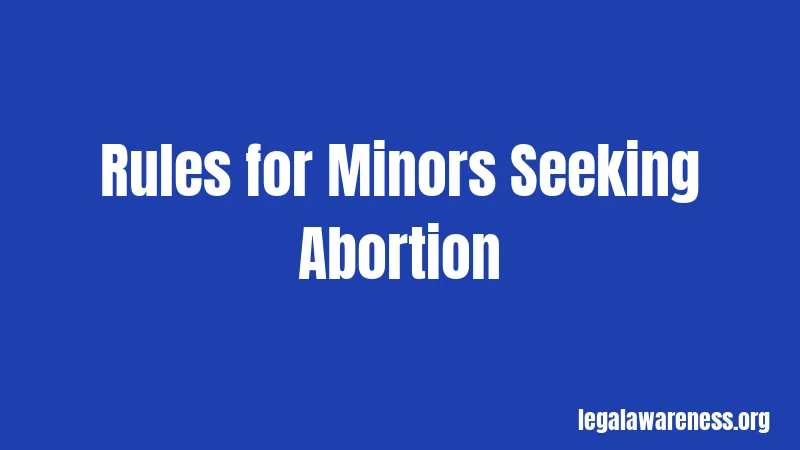Abortion Laws in Missouri (2026): A State in Legal Limbo
Most people have no idea how confusing Missouri’s abortion laws are right now. Seriously. The state is caught between a voter-approved constitutional amendment and lawmakers trying to undo it. Let’s break down exactly what you need to know.
In November 2024, Missouri voters made history. They passed Amendment 3, which protected the right to abortion up to fetal viability. This made Missouri the first state to reverse a near-total abortion ban after the Supreme Court overturned Roe v. Wade.
But here’s the thing. Passing a constitutional amendment didn’t magically make everything simple. Legal battles continue. Old laws remain on the books. And lawmakers are already working to put a new abortion ban on the 2026 ballot.
Sound complicated? It actually is. But don’t worry, we’ll break it down step by step.
What Is Amendment 3?

Amendment 3 is the constitutional amendment Missouri voters approved in November 2024. It passed with about 52% of the vote.
The amendment says the government cannot deny or infringe upon a person’s fundamental right to reproductive freedom. This includes decisions about abortion, contraception, prenatal care, and other reproductive health matters.
Under this amendment, abortion is legal up to fetal viability. Viability means the point when a fetus can survive outside the womb. This is typically around 23-24 weeks of pregnancy. However, a doctor makes the final call on viability.
After viability, abortion is still allowed if necessary to protect the life or health of the pregnant person.
Current Legal Status of Abortion in Missouri
Okay, pause. This part is really important.
Even though Amendment 3 exists, the situation keeps changing. Courts have been going back and forth on which old restrictions still apply.
Here’s what happened after voters approved Amendment 3. In December 2024, a judge blocked Missouri’s total abortion ban and several other restrictions. In February 2025, another court ruling removed barriers that prevented clinics from operating. Surgical abortions resumed in Missouri on February 15, 2025.
Then things got messy. In May 2025, the Missouri Supreme Court lifted those earlier rulings. The abortion restrictions temporarily went back into effect. But in July 2025, a trial court again blocked most restrictions. An appeals court upheld that decision in October 2025.
So where does that leave things now? Surgical abortion is currently available at a few clinics in Missouri. Medication abortion faces more restrictions. And a full trial on the constitutionality of abortion restrictions is set for January 2026.
Where Can You Get an Abortion in Missouri?

Right now, surgical abortions are available at Planned Parenthood clinics in three cities. You can schedule appointments in Kansas City, Columbia, and St. Louis.
The Kansas City clinic can be reached at (816) 756-2277. The Columbia clinic is at (573) 443-0427. The St. Louis clinic is at (314) 531-7526.
Pretty straightforward, right? But here’s the catch.
Medication abortion is still essentially unavailable in Missouri. State regulations have blocked Planned Parenthood from offering abortion pills at their Missouri clinics. This matters because medication abortion is used in about two-thirds of all abortions nationwide.
If you need medication abortion, you may need to travel to nearby states like Illinois or Kansas. The Hope Clinic in Granite City, Illinois is just 10 minutes from downtown St. Louis. They offer both medication and surgical abortions.
What Restrictions Are Currently in Effect?
This is where things get tricky. Missouri has many abortion laws still on the books. Some are blocked by court orders. Others remain in effect. The situation could change again at any time.
Restrictions That Are Currently Blocked
A court order is currently preventing enforcement of several restrictions. These include Missouri’s total abortion ban, the 72-hour waiting period, mandatory counseling requirements, and the telemedicine ban for abortion services.
The admitting privileges requirement is also blocked. This rule previously required abortion providers to have hospital admitting privileges within 15 minutes of their clinic.
Restrictions That May Still Apply
Some restrictions remain in effect or are being contested. Missouri law still requires that only licensed physicians can perform abortions. Medication abortion faces additional regulations that have prevented clinics from offering it.
Minors still need parental consent to get an abortion. If a minor cannot get parental consent, they can seek what’s called a judicial bypass. This means asking a judge for permission instead. More on this below.
Rules for Minors Seeking Abortion

If you’re under 18, Missouri law requires parental involvement. You’re not alone in finding this confusing. It trips up a lot of people.
Here’s how it works. At least one parent or legal guardian must consent to your abortion. That parent must also certify that any other custodial parent has been notified.
If you can’t get parental consent, you have an option called judicial bypass. This allows you to ask a judge to approve your abortion instead. The court will determine if you’re mature enough to make the decision yourself. Or they may decide the abortion is in your best interest.
Wondering how to navigate this process? You can text Right By You at 855-458-0886 for help. They specialize in helping young people with pregnancy decisions.
One more thing. If you’re a Missouri resident under 18, you can get an abortion in Illinois without parental involvement. Illinois does not require parental consent or notification for minors.
Penalties for Illegal Abortions
What happens if abortion restrictions are enforced? Let’s talk about what’s at stake.
Under Missouri’s trigger ban, performing an illegal abortion is a Class B felony. This carries a prison sentence of 5 to 15 years. Providers can also have their medical licenses suspended or revoked.
Hold on, this part is important. The law specifically protects people who get abortions. A woman who receives an abortion cannot be prosecuted for conspiracy under this law. The penalties target providers, not patients.
For abortions performed after viability in violation of state law, the penalty is a Class D felony. This includes a minimum one-year prison sentence and fines between $10,000 and $50,000.
Right now, these penalties don’t apply to abortions performed before viability. Amendment 3 protects that right. But this could change if voters approve the new ballot measure in 2026.
The 2026 Ballot Measure: What You Need to Know
Here’s where things get interesting. Missouri lawmakers are trying to put abortion back on the ballot.
In May 2025, the Republican-majority legislature approved a new ballot measure. If voters approve it in November 2026, it would repeal Amendment 3. It would ban most abortions again.
The proposed measure would only allow abortions in cases of medical emergency, fetal abnormality, or rape and incest. For rape and incest cases, abortion would only be legal within the first 12 weeks. The rape or incest would need to be reported to law enforcement.
The ballot measure would also ban gender transition procedures for minors. These two issues are combined into one measure.
Honestly, this is a big deal. Voters approved abortion rights in 2024. Now they’ll be asked to take those rights away in 2026. Both sides are preparing for another major campaign.
Medication Abortion: The Ongoing Battle
Medication abortion deserves its own section because it’s so contested in Missouri.
Medication abortion uses two pills. The first pill, mifepristone, stops the pregnancy from developing. The second pill, misoprostol, causes the uterus to expel the pregnancy tissue. This method is FDA-approved for use up to 10 weeks of pregnancy.
In Missouri, state regulations have made it nearly impossible for clinics to offer medication abortion. The state health department rejected Planned Parenthood’s complication plans in March 2025. These plans are required before a clinic can offer abortion pills.
The regulations include requirements that many providers consider impossible to meet. For example, an on-call OB-GYN must live within 25 miles of the clinic. They must be available for seven days after a patient takes the medication.
A court is currently deciding whether these restrictions violate the state constitution. Until that’s resolved, Missourians seeking medication abortion typically need to travel out of state.
Missouri’s attorney general is also part of a federal lawsuit challenging FDA approval of mifepristone nationwide. If successful, this could restrict access to medication abortion across the entire country.
How Much Does Abortion Cost in Missouri?
Let’s talk numbers. The average in-clinic abortion under 12 weeks costs about $650. Medication abortion is typically less expensive, averaging around $150.
Costs increase the further along the pregnancy is. Later abortions can cost $10,000 or more.
Here’s something important. Missouri law prevents private insurance from covering abortion costs. Federal law also bans using Medicaid for abortions except in limited circumstances.
If you need financial help, abortion funds can assist. The Missouri Abortion Fund helps pay for out-of-state abortions. You can also ask about financial assistance when scheduling your appointment. Many clinics offer sliding scale pricing.
Resources and Where to Get Help
Need help now? Here are the key resources.
For clinic appointments, contact Planned Parenthood at the numbers listed earlier. You can also visit AbortionFinder.org to search for verified providers.
For emotional support, All-Options offers non-judgmental support at 1-888-493-0092. Exhale provides after-abortion support as well.
If you need help with travel, lodging, or other logistics, contact the Regional Logistics Center at 618-607-5080. They help patients accessing abortion at Planned Parenthood or Hope Clinic.
For legal questions about self-managing an abortion, call the Repro Legal Helpline at 844-868-2812. They provide confidential legal support.
What’s Next for Missouri Abortion Laws
The legal situation in Missouri will keep evolving. Here’s what to watch.
A full trial on the constitutionality of Missouri’s abortion restrictions is scheduled for January 2026. This could provide more clarity on which restrictions are allowed under Amendment 3.
In November 2026, voters will decide on the new ballot measure. If it passes, abortion would again be banned in most circumstances.
Some lawmakers have introduced even more extreme bills. One bill filed in December 2025 would classify abortion as murder. However, Republican House Speaker Jon Patterson said these bills have no chance of passing.
Missouri’s abortion laws will likely remain in legal limbo for some time. The best advice? Stay informed. Know your rights. And if you need care, don’t hesitate to reach out to the resources listed above.
Frequently Asked Questions
Is abortion legal in Missouri right now? Yes, surgical abortion is currently legal up to fetal viability. Court orders are blocking most of Missouri’s abortion restrictions. However, medication abortion faces additional hurdles that have prevented clinics from offering it.
How far along can you be to get an abortion in Missouri? Under Amendment 3, abortion is protected until fetal viability. This is typically around 23-24 weeks, though a doctor makes the final determination. After viability, abortion is only allowed to protect the health or life of the pregnant person.
Do I need parental consent if I’m under 18? Yes, Missouri requires at least one parent or guardian to consent to a minor’s abortion. If you can’t get consent, you can seek judicial bypass from a court. You can also travel to Illinois, which has no parental consent requirement.
Can I get the abortion pill in Missouri? Not currently at most clinics. State regulations have prevented Planned Parenthood from offering medication abortion. This is being challenged in court. For now, you may need to travel out of state for medication abortion.
Will abortion be on the ballot again in 2026? Yes. Missouri lawmakers approved a ballot measure that would repeal Amendment 3 and ban most abortions. Voters will decide in November 2026.
Final Thoughts
Missouri’s abortion laws are genuinely confusing right now. The state passed a constitutional amendment protecting reproductive freedom. But legal battles continue, old restrictions linger, and lawmakers want voters to reverse course.
For now, surgical abortion is available at a few clinics in Kansas City, Columbia, and St. Louis. Medication abortion remains restricted. And the future depends on court decisions and the 2026 ballot measure.
If you need abortion care, reach out to the resources above. If you’re unsure about your rights, consider consulting with a healthcare attorney. And stay informed, because things are likely to change again.
Now you know the basics. Stay safe, stay informed, and don’t hesitate to ask for help when you need it.
References
- Center for Reproductive Rights. “Missouri Abortion Laws by State.” https://reproductiverights.org/maps/abortion-laws-by-state/missouri/
- Missouri Independent. “Missouri abortion rights amendment trumps most restrictions, judge rules.” July 2025. https://missouriindependent.com/2025/07/03/missouri-abortion-rights-amendment-trumps-most-restrictions-judge-rules/
- Ballotpedia. “Missouri Amendment 3, Right to Reproductive Freedom Initiative (2024).” https://ballotpedia.org/Missouri_Amendment_3,Right_to_Reproductive_Freedom_Initiative(2024)
- FindLaw. “Missouri Abortion Laws.” August 2025. https://www.findlaw.com/state/missouri-law/missouri-abortion-laws.html
- Missouri Revisor of Statutes. “Section 188.017 – Right to Life of the Unborn Child Act.” https://revisor.mo.gov/main/OneSection.aspx?section=188.017
